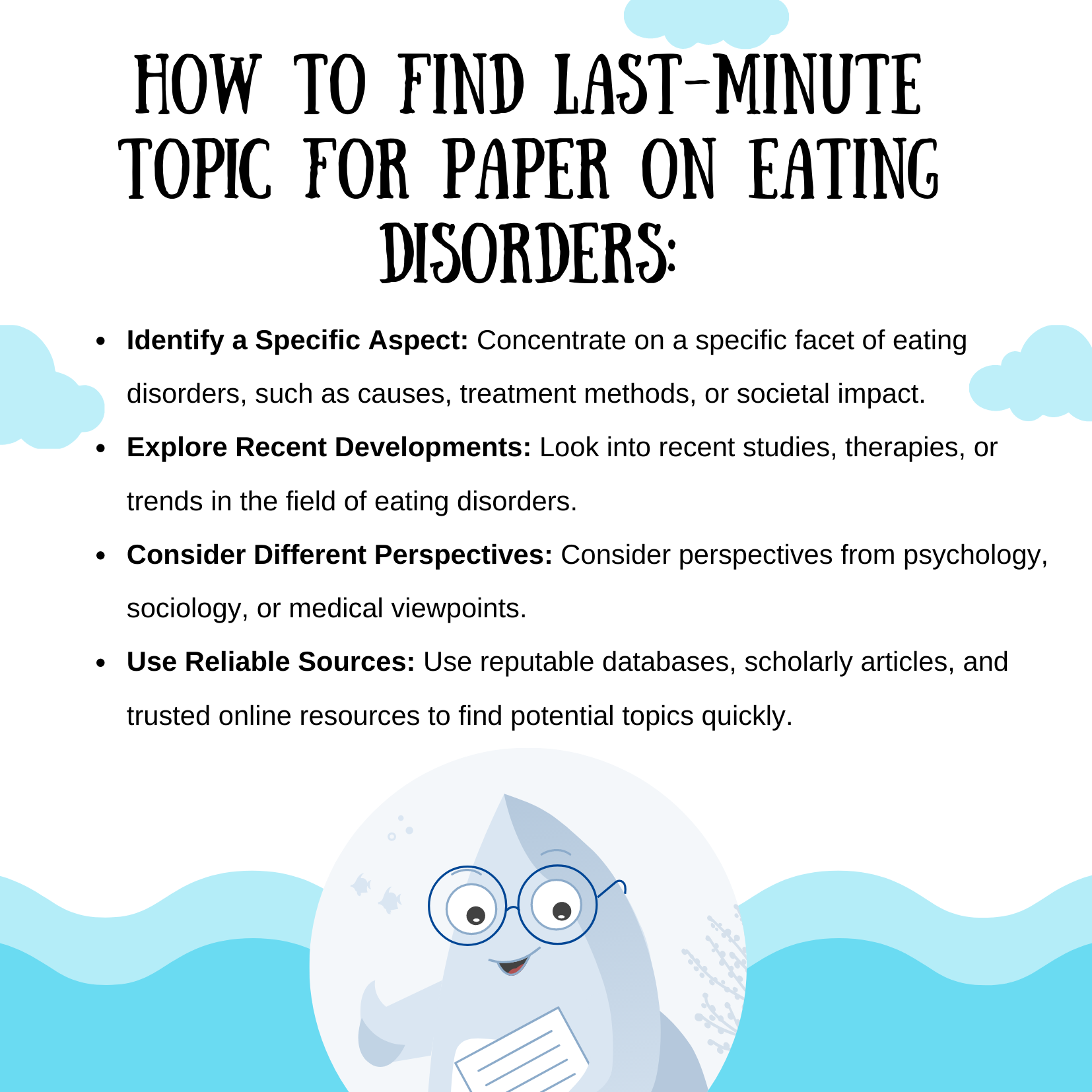Modern society actively spreads the image of slimness as one of the important components of beauty. Every day, from TV commercials, social media, and magazines, we see thin models with ideal proportions and make-up. Such trends have lead to the constant development of eating disorders among all segments of the population. From one side, we think: what can be harmful in being slim? Keeping a healthy diet and eliminating artificial components can only benefit a person’s health. But for some people the aim of being thin turns into an obsession and an eating disorder.
In this article we would like to share with you the most interesting topics connected to eating disorders. You can freely use them as a basis for your essay or research paper. We have divided the list into categories for your convenience. Here are the topics for your inspiration.
Table of contents
- Eating Disorder Essay – children and adolescents
- Eating disorder thesis topics – psychological issues
- Research topics on eating disorders – gender issues
- Eating disorder topics on treatment
- Social and cultural issues of eating disorders topics
- Causes of eating disorders topics
- Food for thought: more ideas to explore
- Professional help with writing papers on eating disorders
Eating Disorder Essay – children and adolescents
- Analyze the psychological causes of eating disorders among children. What are the methods of prevention and correction?
- Discuss peculiarities of diagnosis of anorexia nervosa among children and adolescents. What diagnostic management is more effective for children?
- How do eating disorders influence the physical and mental development of children? What are long-term consequences?
- Explain eating disorders from the perspective of developmental psychology (children, adolescents, adults).
- Discuss the role of parents in preventing eating disorders in children. What children are more prone to eating disorders?
- Study the influence of the family and culture on children with anorexia nervosa.
- Explain the meaning of awareness-raising classes on eating disorders among children and adolescents. How will it affect their social life, emotions, mentality, and physical form?
- Analyze the consequences of anorexia nervosa on adolescents.
- Explain how TV shows influence eating disorders on children and adolescents.
- Discuss the peculiarities of treating eating disorders among children and teenagers.
- Are students from private schools more prone to eating disorders than students from public schools?
- Analyze the occurrence of self-injurious behavior among girls with eating disorders.
- How does bullying affect the advancement of eating disorders? Consider recent publications about abuse, bullying, and discrimination at schools and colleges.
Eating disorder thesis topics – psychological issues
- Explain the connection between depression and eating disorders. How do symptoms of these two diseases overlap? What treatment programs should be applied?
- Explain the psychological causes of eating disorders. You can discuss perfectionism, body image dissatisfaction, anxiety disorders, and behavioral inflexibility.
- Why are fashion models prone to eating disorders?
- Explain the role of psychotherapy (psychological concealment) in treatment of eating disorders.
- Why is an eating disorder considered a mental illness?
- Analyze an eating disorder from a cognitive and behavioral approach.
- Analyze the cognitive impairments in patients with eating disorders.
- How can bulimia and anorexia lead to suicide? What people are at high risk?
- Define the effect of positive behavior therapy among patients with eating disorders.
- How do body shame and body dissatisfaction contribute to eating disorders?
- Describe atypical variations of anorexia nervosa and bulimia.
- What is orthorexia? Can orthorexia be related to an eating disorder? Why?
Research topics on eating disorders – gender issues
- Describe psychological characteristics of women who struggle from eating disorders.
- Describe the peculiarities of eating disorders among female athletes. What are the risk factors and diagnostic problems? Explain the factors that assist the recovery.
- Find out why women are more prone to eating disorders than men. Examine recent statistics and publications on this topic. How does brain response influence the occurrence of the eating disorder?
- Discuss the peculiarities of eating disorders among women of color. Does skin color raise the probability of anorexia nervosa?
- What are the main signals of eating disorders among men? What signs are more common to men? Why is anorexia diagnosis usually underestimated for men?
- What are the possible consequences of eating disorders? How does it influence fertility in women?
- Why are fashion models prone to eating disorders? How does it occur? How can it be prevented?
- Discuss the trends of eating disorders among the LGBT society. Compare the statistics of heterosexual women and men, and gay/lesbian/bisexual men and women. What are the main reasons of eating disorder development?
- What are the peculiarities of eating disorders among male and female military officers? Discuss risk factors, lifestyle, and diagnostic challenges.
Eating disorder topics on treatment
- Describe the main symptoms of all types of eating disorders. Explain the peculiarities of diagnosing eating disorders.
- Explain the role of dieting in the treatment program of bulimia and anorexia.
- What is the treatment potential of Ayahuasca on the treatment of eating disorders?
- Explain various treatment options and strategies for treatment anorexia/bulimia/binge eating disorders.
- Should treatment of eating disorders be included in health insurance plans? Why?
- Explain the biological aspects of bulimia/anorexia nervosa and analyze treatment options.
- Discuss the role of family in the treatment therapy of patients with eating disorders.
- What ethical issues are connected to the compulsory treatment of eating disorders?
- Find out the effectiveness of Virtual Reality Graded Exposure Therapy (VRGET) in treatment of anorexia nervosa and bulimia.
- Are psychedelic compounds effective in the treatment of eating disorders? In what cases?
- Explore the latest approaches in the treatment of eating disorders. For example, you can discuss deep brain stimulation or real-time functional magnetic resonance imaging.
- Define the role of peer support groups for people with eating disorders.
- Why do anorexia and bulimia remain a problem? What are stopping factors? Analyze why eating disorders are hard to cure.
- Explain the importance of balancing metabolism in eating disorders.
Social and cultural issues of eating disorders topics
- Analyze how social and cultural factors may influence the development of eating disorders.
- How does the body image created by media, magazines, and the internet affect eating disorders?
- Analyze how social media influences the development of eating disorders. What types of eating disorders are caused by excessive use of social media? What other health problems are related to the issue?
- Are eating disorders a social issue? How do countries and local communities try to reduce the causes of eating disorders?
- How does western culture relate to eating disorders? Why?
- How can eating disorders be prevented in a particular country (of your choice)?
- Explain how eating disorders are glamorized in magazines, social media, and TV.
- Why do various cultures have different rates of patients with eating disorders? What cultures have protective factors?
Note: We want you to know, that we have designed a variety of amazing tools, such as an essay calculator or words in pages tool, for your convenience. Explore it if you are interested!
Causes of eating disorders topics
- Analyze eating disorders considering environmental causes. Discuss anorexia and other eating disorders in terms of DSM-5 criteria.
- Do calorie tracing applications and programs influence the occurrence of eating disorders? How do they contribute to eating disorders? Examine the latest publications and statistics.
- How are sleeping disorders and circadian rhythms connected to the emergence of eating disorders? Examine the biological components of sleeping. Consider Night Eating Syndrome (NES) and other sleep-related eating disorders.
- How does alcohol and substance abuse link to eating disorders? What are the main strategies of treating addictive behaviors?
- How is drug abuse connected to eating disorders in sports?
- Explain the relationship between anorexia nervosa and vegetarianism.
- Does pressure in sports contribute to the occurrence of eating disorders among athletes?
- Discuss the connection of disorders of sexual behavior in anorexia nervosa.
- Do genetic factors cause eating disorders?
- What is the relationship between body fat level and the possibility of developing an eating disorder?
- How is sex abuse related to eating disorders?
- Explain how the primary drive of hunger affects eating disorders. Consider intrinsic and extrinsic motivations.
- How is obesity connected to eating disorders?
- What are biological consequences of patients with an eating disorder?
Food for thought: more ideas to explore
Here we want to share with you scientific and fiction books where you may find helpful information, insights, and inspiration for your essay. These books consider various sides of eating disorders, including personal experiences depicted in monographs. You can do an interdisciplinary research study and explore how psychological disorders lead to eating disorders and even suicidal thoughts
Scientific-based books:
“Eating Disorders: Cultures in Transition” by Nasser, Katzman, and Gordon
“Skills-Based Learning for Caring for a Loved One with an Eating Disorder: The New Maudsley Method” by Janet Treasure
“Demystifying Anorexia Nervosa: An Optimistic Guide to Understanding and Healing” by Alexander R. Lucas
“Am I Thin Enough Yet? The Cult of Thinness and the Commercialization of Identity” by Sharlene Hesse-Biber
“The Psychology of Eating and Drinking” by A. W. Logue
“Decoding Anorexia” by Carrie Arnold
“Body Image, Eating Disorders, and Obesity in Youth: Assessment, Prevention, and Treatment” by Linda Smolak and J. Kevin Thompson
“Exacting Beauty: Theory, Assessment, and Treatment of Body Image Disturbance” by J. Kevin Thompson, Leslie J. Heinberg, and Madeline N. Altabe
Fiction and memoirs:
“Thin” by Lauren Greenfield
“Life Without Ed: How One Woman Declared Independence From Her Eating Disorder and How You Can Too” by Jenni Schaefer
“Wasted: A Memoir of Anorexia and Bulimia” by Marya Hornbacher
“Just Listen” by Sarah Dessen
“Brave Girl Eating: A Family’s Struggle With Anorexia” by Herriet Brown
“Identical” by Ellen Hopkins
“Please Eat…: A Mother’s Struggle to Free Her Teenage Son From Anorexia” by Bev Mattocks
“The Time in Between: A Memoir of Hunger and Hope” by Nancy Tucker
“Massive” by Julia Bell
Also, you may be interested in movies connected with eating disorders. You can discuss the films or books listed here during your classes or write a book or movie review.
Movies:
“The Best Little Girl in the World” (1981)
“Superstar: The Karen Carpenter Story” (1988)
“Life Is Sweet” (1990)
“For the Love of Nancy” (1994)
“301, 302” (1995)
“When Friendship Kills” (1996)
“Perfect Body” (1997)
“Girl, Interrupted” (1999)
“Sharing the Secret” (2000)
“Dying to Dance” (2001)
“Hunger Point” (2003)
“Our Time Is Up” (2004)
“Thin” (2006)
“200 Pounds Beauty” (2006)
“Beautiful” (2008)
“God Help the Girl” (2014)
“The Road Within” (2014)
“Thinspiration” (2014)
“To the Bone” (2017)
Professional help with writing papers on eating disorders
We hope that our insights and ideas have inspired you on writing your academic paper. We recommend you to make a list of the most interesting topics from our list and look through available information about the topics. All issues that we choose for our lists can be developed well and turned into a solid essay or research paper. If you have selected a topic, but feel that you need help with the writing part, ask our paper writers to help you. Send us your specifications and the rest of our writers will do it for you!
Photo by igorovsyannykov from Pixabay










